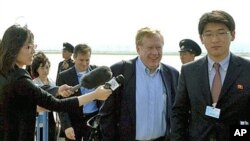The United States has welcomed North Korea’s announcement that it will release a U.S. citizen held there since last November on unspecified charges. The move came as a senior U.S. diplomat ended a mission to North Korea to assess that country’s pleas for food aid.
The State Department is welcoming North Korea’s announced intention to free California businessman Eddie Jun, though it says the gesture will not factor into any decision on providing Pyongyang with new U.S. food aid.
The decision to release Jun was conveyed to the U.S. envoy for North Korean human rights Robert King, who arrived Tuesday along with a team of U.S. experts to assess North Korean food needs.
Officials here said King will leave North Korea on Saturday, while arrangements are being made for Jun to travel home separately.
Media reports said Jun had gone to North Korea to conduct Christian missionary work, while North Korea said he had admitted to committing an unspecified crime against the communist state.
North Korea has asked the United States and several other countries for food help because of poor harvests due to bad weather.
State Department Acting Deputy Spokesman Mark Toner said the United States had urged Jun’s unconditional release on humanitarian grounds and said the decision by Pyongyang is a positive step.
However, he said it would not figure into any food aid decision, which officials here say will be based on actual needs and North Korea’s willingness to allow strict monitoring of food distribution.
“Any decisions about food aid are not related in any way to policy-related decisions, if you will," said Toner. "It’s a separate process altogether. We have the food-assessment team there. They’re conducting their mission. When they come back we’re going to look at their assessment, study it, compare it to some of the other assessments that have been done by various NGO’s and the World Food Program, and then make a decision based on that.”
Toner declined comment on reports in the North Korean media that King had expressed regret about the Jun case and had said the United States would do all it can to prevent a recurrence.
U.S. citizens are not legally barred from traveling to North Korea, but an official here said the practice is discouraged because of the country’s capricious legal system.
The United States has been the largest single donor of food aid to North Korea over the years, including major shipments during the country’s famine in the 1990’s. But aid was suspended in 2008 in a dispute over monitoring.
Last week, a bipartisan group of U.S. senators wrote Secretary of State Hillary Clinton urging caution in supplying any new aid, saying while they are appalled by chronic food shortages, the United States should avoid steps that would bolster the communist government.
King’s visit, the first by a U.S. human rights envoy to North Korea, is widely seen as a measure of Pyongyang’s sense of alarm over food supplies.
U.S. aid experts who accompanied King are expected to remain in North Korea several more days to assess food needs in outlying areas of the country.
US Welcomes Pending Release of American by North Korea




